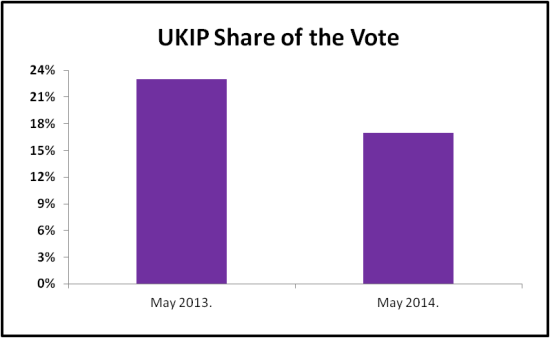There has been much media coverage of how well UKIP have done in the local authority elections that took place at the same time as the European elections on Thursday. If you listen to the BBC, it’s been a triumph for Nigel Farage and his motley crew.
But has it? Labour commentator Eoin Clarke posted this useful chart on Twitter:
That’s right. UKIP’s share of the vote has actually dropped since this time last year. Not that you’d realise it, from the media coverage.
So how come UKIP gained council seats? The answer to that is fairly simple.
Unlike a general election, not all councils have their elections at the same time. Local authority elections take place every May, so each year there is approximately a quarter of all council seats up for grabs.
The reason that UKIP gained seats this year, despite polling lower than last year, is that the seats they were contesting this year are ones which were last contested in 2010. And UKIP didn’t do particularly well in the elections that year, so any decent showing this time round would mean a gain. In fact, UKIP would have gained seats even if their share of the vote had dropped far more than it actually did.
2010 was also the year of the most recent general election, in which both the Conservatives and Lib Dems did well at the expense of Labour. So, assuming that the local election results reflect the national opinion polls, both of those parties were always going to lose seats.
This cannot, however, go on forever. Eventually a full cycle of local elections will have completed and UKIP will be fighting to hold their previous gains as well as aiming to make new ones.
On current trends, that’s going to start happening in around two or three years time. UKIP’s high water mark in local elections was last year, so unless they can reverse this year’s drop and start gaining again then they will start losing seats in 2017, or possibly even in 2016.
This is a very long way from representing a breakthrough in UKIP’s electoral prospects. On the contrary, this year’s results suggest that UKIP’s growth has stalled. Which, of course, is precisely what any thoughtful person would expect.
Incidentally, the thumbnail image at the top of this post is my own suggested UKIP logo, made a couple of years ago. I do feel ever so slightly smug about how prophetic it turned out to be.

